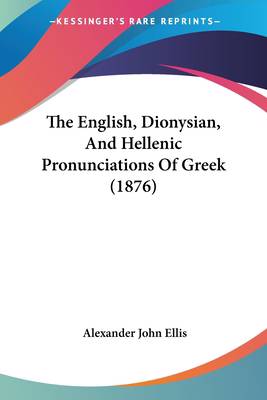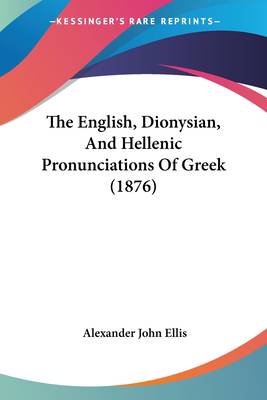
- Retrait gratuit dans votre magasin Club
- 7.000.000 titres dans notre catalogue
- Payer en toute sécurité
- Toujours un magasin près de chez vous
- Retrait gratuit dans votre magasin Club
- 7.000.0000 titres dans notre catalogue
- Payer en toute sécurité
- Toujours un magasin près de chez vous
The English, Dionysian, And Hellenic Pronunciations Of Greek (1876)
Alexander John Ellis
Livre broché | Anglais
25,95 €
+ 51 points
Description
The English, Dionysian, and Hellenic Pronunciations of Greek is a book written by Alexander John Ellis and published in 1876. The book provides a comprehensive analysis of the different ways in which the Greek language is pronounced, including the English, Dionysian, and Hellenic pronunciations. The author begins by discussing the history of Greek pronunciation and how it has evolved over time. He then delves into the different methods of pronunciation, providing detailed explanations and examples for each. The English pronunciation is characterized by its use of stress and the length of vowels, while the Dionysian pronunciation is known for its use of pitch and tone. The Hellenic pronunciation, on the other hand, is considered to be the most authentic and closest to the original Greek pronunciation. Throughout the book, Ellis provides a wealth of information on the nuances of each pronunciation method, including their strengths and weaknesses. He also discusses the controversies surrounding the proper pronunciation of Greek and the different opinions held by scholars and linguists. Overall, The English, Dionysian, and Hellenic Pronunciations of Greek is a valuable resource for anyone interested in the history and pronunciation of the Greek language. Its detailed analysis and comprehensive coverage make it a must-read for scholars, linguists, and anyone interested in the Greek language and its pronunciation.This scarce antiquarian book is a facsimile reprint of the old original and may contain some imperfections such as library marks and notations. Because we believe this work is culturally important, we have made it available as part of our commitment for protecting, preserving, and promoting the world's literature in affordable, high quality, modern editions, that are true to their original work.
Spécifications
Parties prenantes
- Auteur(s) :
- Editeur:
Contenu
- Nombre de pages :
- 56
- Langue:
- Anglais
Caractéristiques
- EAN:
- 9781104238063
- Date de parution :
- 02-04-09
- Format:
- Livre broché
- Format numérique:
- Trade paperback (VS)
- Dimensions :
- 152 mm x 229 mm
- Poids :
- 86 g

Les avis
Nous publions uniquement les avis qui respectent les conditions requises. Consultez nos conditions pour les avis.






